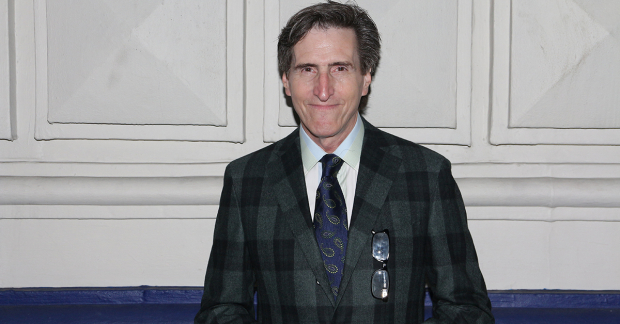Roasting Pilgrims for Thanksgiving With Addams Family Values
Musical-theater buffs insist upon reminding anyone who will listen that "Turkey Lurkey Time," from Promises, Promises, is performed within the show at an office Christmas party. So we must face up to the fact that there aren't any well-known show tunes that offer us something to savor for Thanksgiving.
But don't give up hope. What are those lyrics wafting along on the breeze, thanks to playwright and screenwriter Paul Rudnick and composer Mark Shaiman?
"Happy, happy turkey day
Hunger pains will go away
When you'll hear the pilgrims say
It's happy turkey day."
Admittedly this ditty isn't a Thanksgiving standard, but it's hard to argue with its authors' theatrical pedigree.
Rudnick and Shaiman crafted it not for the stage, but rather for a scene in the film comedy Addams Family Values, released in 1993. The song is heard in an original pageant at summer camp in the film, where Wednesday and Pugsley Addams – offspring of the macabre yet loving Morticia and Gomez – have been exiled due to the machinations of a gold-digging serial murderer with designs on their beloved Uncle Fester.
The benign to the point of vacuous Thanksgiving pageant in Values takes its first satiric turn when Pugsley belts out his big tune while dressed in turkey regalia, leading an avian chorus line.
"Eat us!
Hey, it's Thanksgiving Day,
Eat us!
We make a nice buffet,
We lost the race with Farmer Ed –
Eat us, 'cause we're good and dead."
Following the unintended double-entendre of that song, titled "Eat Me," Wednesday proceeds to hijack the proceedings entirely. Going off-script, outfitted in a stereotypical grade school Native American costume, she puts a stop to the prepared feast, declaring, "The gods of my tribe have spoken. They have said, do not trust the pilgrims." The "unpopular" campers cast as the "Native Americans" proceed to attack "the pilgrims," ultimately setting fire to the scenery and roasting the camp's directors over an open fire.
Nearly 30 years on, Rudnick recalls the creation of the film fondly, including the Thanksgiving melee.
"Almost no one has ever asked, why would kids at a summer camp in July be doing Thanksgiving?," says Rudnick. "I don't remember considering Passover or Christmas – or something more appropriate like the Fourth of July. Thanksgiving gave permission to use pilgrims and all sorts of lunacy that that made sense. There is something irrational about it, but very confident. And that's kind of the secret of life."

(© David Gordon)
How did such a subversive view of one of the quintessential American holidays make it into a show-within-a-movie intended for all audiences?
"The first Addams Family movie was successful," says Rudnick, "so the studio gave us far more leeway with the sequel. We could do much crazier things. I remember asking if we were allowed to drop a baby off a building and they said, 'Absolutely.' I think the Thanksgiving Day pageant somehow came from that feeling of total permission."
While the questioning and tearing down of American myths has become rather commonplace today, the irreverence shown to the holiday was almost radical at the beginning of the Clinton presidency.
"We got to have the subversive message of the Addams Family movies built into that sequence, when you realize that that Wednesday is leading this rebel faction against all of the nasty white people," Rudnick points out. "She was defending the indigenous tribes and being a very good social justice warrior long before that became quite so fashionable."
While there are no Native Americans among the predominantly blonde and blue-eyed campers at the ahistorically named Camp Chippewa, it is Latinx, Asian, Jewish, and disabled campers who upend the conventional narrative.
"I love that the Addamses are very gleeful outcasts," says Rudnick. "They are very nonchalant about being so different from everybody else and think of themselves as sort of graciously superior. So their version of Thanksgiving was about the people who are usually forgotten by Thanksgiving."
Starting with Raul Julia as Gomez Addams, the cast of Addams Family Values is replete with a who's who of theater stalwarts in supporting roles, including Christine Baranski, Nathan Lane, Julie Halston, Harriet Harris, Dana Ivey, Charles Busch, Cynthia Nixon, and many more.
Recounting the first readthrough of the script with the full cast, Rudnick recalls, "We had that amazing cast gathered around, with the studio executives as well. They, of course, were just nailing it right and left. The studio executives afterward asked Barry Sonnenfeld and me, Where did you find these people? And we said, you know, most of them have Tony Awards. They weren't hard to track down. They were just such a group of people that Hollywood was only just discovering."
Rudnick traces the origins of the Thanksgiving scene to his own comically skewed perspective of camp ("a work farm for children") and the holiday ("Wait, you're stealing land that wasn't your own, and you're bringing smallpox?"). Nonetheless, he professes great affection for memories of Thanksgiving.
"I do remember back in in Piscataway, New Jersey, where my mom, who lived to entertain and to decorate, made a big deal of every aspect of Thanksgiving that had nothing to do with the historical record. It was all about creating this perfect table in orange, and russet and yellow and I loved all that. I did. I applauded."
"I think if I was going to create any other sort of Thanksgiving event, it would involve Jews in New Jersey, staking their claim on the holiday. That relates to Addams Family Values because it's about the people who weren't necessarily included at that first Thanksgiving, demanding their place at the table."
And should Rudnick revisit the story, he says, the food will all be brought in Corningware.










